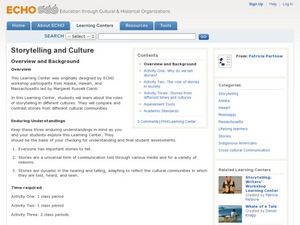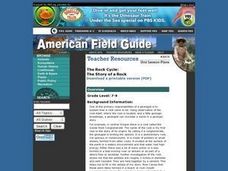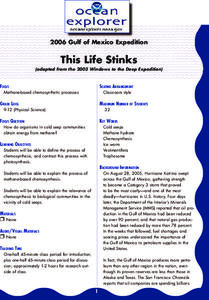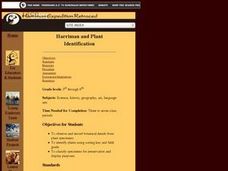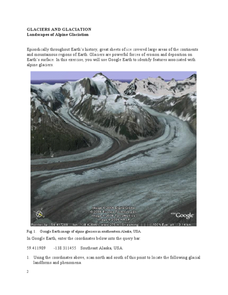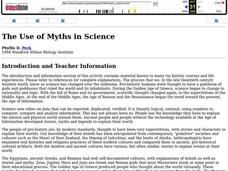Curated OER
Tips for Improving Transition
Vary, bury, pull, fit. These tips for improving transitions in writing are found on a template designed as a teacher resource. A clever way to make memorable these suggestions for improving transitions in writing, the language in the...
Curated OER
Volcanoes and People
Students discover that volcanic eruptions are geologic events that take place within the upper part and on the surface of the Earth's lithosphere. They explain how volcanoes are related to the Earth's lithosphere. They focus on the May...
Curated OER
It's a Gas! Or is it?
Oceanography enthusiasts are given a series of thought experiments to consider in order to relate the solubility of gases and solids to underwater volcanoes. It is not particularly engaging to perform these thought experiments. Choose...
Curated OER
Welcome to Top Score: Verdi's 'Don Carlos'
Students study the elements in the production of an opera including the personalities, ideas, and stage presence. They examine the skills that are necessary to be a performer in an opera in this series of lessons including making...
Curated OER
Complete the Sentences 3
Develop vocabulary in your young learners with this resource. There are a series of sentences here, and elementary schoolers must choose a word from the list to complete each of the 12 sentences. Example words include abolished,...
Curated OER
Storytelling and Culture
Students examine the cultural tradition of storytelling. In this storytelling lesson, students explore stories from 3 different cultures and evaluate the roles that storytelling plays in each of the cultures to pass on values and beliefs.
Curated OER
Weather Proverbs
Define and write proverbs! Learners define proverbs, use the Internet to find weather-related proverbs, and talk with their parents to learn other proverbs. There's a well-structured worksheet included here.
Curated OER
It's a Gas! Or is it?
Examine the effects of temperature and pressure on solubility and the states of matter of ocean water. Learners make inferences about the unique chemistry of ocean water at different depths. They engage in an activity related to...
Curated OER
Cartoons for the Classroom: Oil Spill Perspectives
With the BP oil spill still fresh on your scholars' minds, take the opportunity to analyze various perspectives on it through political cartoons. This critical-analysis handout features 2 cartoons on the incident. Background information...
Curated OER
Cartoons for the Classroom: Celebrating the 19th Amendment
Eighty-eight years after women earned the right to vote, a women ran for president. Young analysts consider the role women play in politics, how they are portrayed, the standards they are held to, and if they are still treated unfairly...
Curated OER
Cartoons for the Classroom: The Veepstakes!
Take a step back in time with this political cartoon analysis worksheet, which features editorial cartoons from the 2008 presidential campaign. Background information allows pupils to "read between the lines" in their analysis, and three...
ProCon
Universal Basic Income
Should the United States adopt a universal basic income? After reading brief background information, scholars research the debate topic by reviewing the top three pros and cons. They also respond to a survey question and review other...
Curated OER
Rock Cycle: The Story of a Rock
Students examine the rock cycle by watching videos and then use creative storytelling techniques to tell the story of a rock as it undergoes geologic changes.
Curated OER
The Rock Cycle: The Story of a Rock
Students describe the changes undergone by rocks during the rock cycle and develop an understanding of the interconnectedness of the rock cycle.
Curated OER
Allusions to Shakespeare in Popular Culture
Send your high schoolers on a scavenger hunt through popular culture (music, television, video games, movies) to find allusions to Shakespeare. They must each provide three to share with the class, and the one they present cannot have...
Curated OER
CSI on the Deep Reef
After some instruction, small groups prepare a written report on chemotrophic organisms. Though not clearly mentioned, this resource would work best if groups have the Internet available to research the vocabulary and different organisms...
Curated OER
This Life Stinks
Chemosynthetic communities of cold seep areas are considered in this lesson. Working in collaborative groups, marine biology or oceanography learners research and prepare a report about oxidation-reduction reactions involved with...
Curated OER
Harriman and Plant Identification
Students observe and record botanical details from the plant specimens. They identify plants using sorting key and field guide and classify specimens for preservation and display purposes.
Curated OER
Can We Be Both Conservationists and Consumers?
High schoolers explore their role as consumers and conservationists and what roles they play in today's economic climate. They explore resource allocation issues. Students analyze data and draw comparisons between historical and...
Curated OER
The Musher's Trail
Second graders follow the Iditarod race that begins in March. They research data and select a musher to trail in the race. Then they write daily in a journal about events that happen on the trail, including pictures from the Website.
Curated OER
Simple Thermodynamics of Transportation
Learners watch videos about various modes of transportation, they examine the energy transformations that occur in each, and they be introduced to the laws of thermodynamics.
Curated OER
Landscapes of Alpine Glaciation
In this glaciers activity, students use Google Earth to look for examples of different glacial landforms and phenomena. Students complete 2 short answer questions.
Curated OER
The Use of Myths in Science
Learners are told stories, myths and legend to explain their world. After telling the tales and discussion them, students are assigned to write a myth that describes a familiar situation, such as why the school garbage cans are always...
Curated OER
The Use of Myths in Science
Students examine folk tales to determine the basis for scientific myths. They demonstrate through the discussion of the folk tales that the perception of the world has changed as new information is gained. They write their own folk...







